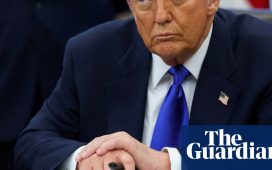Kamala Harris and Donald Trump offer two starkly different visions for the country with much at stake – from pocketbook economic issues and reproductive rights to the strength of the country’s global alliances and existential questions about the future of American democracy and the planet.
As they compete for the White House, both candidates have laid out their plans in speeches, campaign ads and media interviews. Most of it amounts to a wish list, sketched out in broad strokes and lacking concrete details about how they would be implemented or paid for. A number of Trump’s proposals raise legal questions, while some of Harris’s would probably require Democratic control of Congress.
Kamala Harris policies on the economy
On the top issue for voters this election, Harris is tied to the Biden administration’s record on the economy – for better or worse.
Inflation: While the overall economic picture has brightened in recent months, Harris has said she agrees with Americans that prices are “still too high” after several years of significant inflation. Harris says she wants to build up the “opportunity economy,”, focused on the middle class, with plans to combat price gouging, boost housing development, aid first-time homebuyers and expand tax credits for parents.
Taxes: Harris has pledged to cut taxes for tens of millions of middle- and low-income families, while saying she supports tax breaks for entrepreneurs and small business owners. She also backs a proposal championed by Trump to eliminate taxes on tips.
Trade: Harris is expected to maintain the Biden administration’s approach, relying on tariffs and export controls to boost domestic competitiveness with China. On the campaign trail, she has also touted the Biden administration’s ambitious investments in infrastructure and renewable energy.
Donald Trump policies on the economy
Trump continues to tout his pre-pandemic record.
Inflation: Much of Trump’s inflation-reduction plan hinges on his vow to slash energy costs by expanding oil and gas drilling and deregulation, though economists say his plans for sweeping tariffs and mass deportations could actually raise costs. He has also been highly critical of high interest rates, the Federal Reserve’s main inflation-fighting tool. Trump said recently that he thinks the president should have a say in decisions made by the Fed, which traditionally operates independently from politics.
Taxes: In a second term, he has vowed to extend and expand a suite of tax cuts he signed into law in 2017, while pledging to cut the corporate tax rate to 15% from 21% for companies that make their products in the US. He has also said he would exempt Social Security benefits, in addition to tips, from income taxes.
Trade and tariffs: Trump has called himself as the “tariff man”, casting it as a solution to the country’s myriad economic problems, from revitalizing a sagging auto industry to bringing down the high cost of childcare. The former president has suggested blanket tariffs of 10% to 20% on virtually all imports, as well as slapping tariffs of 60% – or more – on goods from China. He has said he would ask Congress for the authority to impose a reciprocal tariff on any country that imposes one on the US.
Kamala Harris policies on abortion
Harris was a vocal proponent of reproductive rights before she became the nominee, assailing Trump and Republicans for creating a “healthcare crisis” that has led to the preventable deaths of women seeking abortion care.
Roe v Wade and abortion bans: As a candidate, she has called on Congress to pass legislation to restore the protections of Roe v Wade, which the supreme court overturned in 2022 and which in effect blocked states from banning abortion before fetal viability, or about 24 weeks of pregnancy. As president, Harris has vowed she would veto any nationwide abortion ban.
IVF: Harris pledged to protect access to contraception and other fertility treatments such as in vitro fertilization (IVF). She has also touted efforts by the Biden-Harris administration to safeguard access to medical abortion and protect women who cross state lines to access the procedure.
Donald Trump policies on abortion
Trump has alternately bragged about his role appointing three supreme court justices whose votes were decisive in overturning Roe and complained that bans on abortion in Republican-controlled states may hurt him electorally.
Roe vs Wade and abortion bans: Trump has said abortion access should be left to the states, and has vowed that as president he would not sign a national abortion ban. (Weeks before making that pledge, he refused to say whether he would veto such a ban.)
IVF: He has also said that if he wins he would make IVF free for women, though has provided few specifics and Republicans in Congress have repeatedly blocked legislation that would protect the treatment.
Abortion pills: Project 2025, the infamous playbook of policy proposals for the next conservative president, suggests using a 19th-century anti-vice law to ban the mailing of abortion pills, which account for two-thirds of US abortions. Because this law is already on the books, a President Trump could enforce it without congressional action.
Kamala Harris policies on democracy
Harris, like Biden, views Trump as a direct threat to democracy. She has highlighted her role as a prosecutor to draw a contrast with Trump, who was found guilty of 34 felony counts in a New York hush-money case over his attempt to influence the outcome of the 2016 campaign. He also faces several other cases related to his efforts to overturn his 2020 defeat and his handling of classified documents. Harris has relied on anti-Trump Republicans to help remind Americans of Trump’s role inciting the deadly attack on Congress of 6 January 2021.
Reform: Harris has also said that she is willing to eliminate the filibuster to codify abortion rights, a reform many Democrats believe would help ease some of the legislative gridlock in Congress.
Voting rights: As vice-president, she led the push to pass federal voting rights legislation.
Donald Trump policies on democracy
Election denialism: Trump has never stopped fully repeating the lie that his 2020 presidential election loss to Joe Biden was marred by fraud. He has refused to say whether he would accept the results of the 2024 election, suggesting that the only way his opponent could win is if she cheated. He has also said he would pardon defendants convicted for their roles in the January 6 attack on the US Capitol. Trump is also facing federal charges over his attempt to overturn the results of the election, including his actions related to the violent Capitol assault. Trump, who has signaled his intention to surround himself with loyalists, has said he would retaliate against his political opponents, threatening to use the justice department to prosecute Democratic lawyers, elections officials, donors and even voters. This would be a sharp break from Democratic norms in the United States, where federal law enforcement is supposed to be apolitical.
Kamala Harris policies on border security and immigration
Harris has sought to flip the script on immigration, one of her biggest political vulnerabilities.
Border security: During a visit to the border in September, she laid out a plan to enact stricter penalties for people who attempt to claim asylum between lawful ports of entry. Arrests of people for crossing the southern border reached record levels during the early years of the Biden administration, but have fallen sharply since he implemented an asylum clampdown. As vice-president, Harris was tasked with addressing the root causes of migration. Trump and Republicans blame her for the situation at the border, describing it as overrun as a result of Biden’s overly lenient immigration policies.
Immigration reform: But Harris says it was Trump who has refused to address the situation by derailing a bipartisan Senate deal aimed at toughening the asylum processes and increasing border resources. She has also called for comprehensive immigration reform, including pathways to citizenship for undocumented people, especially those who were brought to the US as children.
after newsletter promotion
Donald Trump policies on border security and immigration
Immigration is Trump’s signature issue. In a second term, he has vowed to go much further than he did four years ago.
Deportation: He has promised to carry out the largest domestic deportation operation in US history. He has said he would reinstate several controversial policies from his first term, including the Remain in Mexico program, Title 42 and a travel ban targeting several Muslim-majority nations. He has vowed to rescind programs that shield undocumented people from deportation, including children, while revoking the legal status of potentially hundreds of thousands of immigrants in the US under the federal temporary protected status program. Trump has also suggested he would end birthright citizenship for the US-born children of undocumented people – a proposal that experts say is unlikely to prevail in court – and impose “ideological screenings” for immigrants.
Anti-immigrant sentiment: Beyond his policy, Trump has used his rhetoric to stoke fear of immigrants, claiming that the country was being “invaded” and amplifying rightwing lies about immigrant populations in places like Springfield, Ohio, where Haitians have become targets of threats and vitriol since the former president repeated a false rumor about the community. He has also echoed Adolf Hitler, saying that immigrants coming to the US were “poisoning the blood of our country”.
Kamala Harris on foreign policy
Global alliances: Harris’s approach to foreign policy has hewed closely to the president’s, with an emphasis on maintaining the US’s global alliances, especially Nato.
Russia-Ukraine war: She has fully aligned herself with the Biden administration’s response to Russia’s invasion of Ukraine nearly three years ago, pledging unyielding support for the nation as it battles to repel Russian forces from its territory. Harris has repeatedly attacked Putin’s “brutality” and warned that Trump would force Ukraine to “surrender” to Russia.
Middle East crisis: In the Middle East, Harris again has been broadly supportive of the administration’s approach to Israel’s widening war, which began in Gaza and now includes Lebanon, Yemen and Iran. Like Biden, Harris has called for a ceasefire in Gaza in exchange for the release of hostages taken by Hamas on 7 October 2023. Harris has said the US will always defend Israel’s right to defend itself, but has also been more vocal in expressing empathy for the more than 41,000 Palestinians killed during the yearlong conflict that has deeply divided her party. She supports a two-state solution, with an independent Palestinian state.
China: She has signaled a continuation of Biden’s tough-on-China approach and has said she would honor the US’s commitments to Taiwan.
Donald Trump on foreign policy
Trump, who shares isolationist impulses, has repeatedly said that the world was a more peaceful place when he was in power.
Global alliances: He has long been a skeptic of global alliances. Nato continues to be a top target of his disdain – he once said he would “encourage” Russia to invade a member country if it wasn’t paying enough. He has not ruled out withdrawing from Nato, and even suggested he might step back from other alliances.
Russia-Ukraine war: With many of his supporters opposed to continuing the flow of US aid to Ukraine, Trump has vowed to “fundamentally re-evaluate” the country’s approach. He has claimed that he will end the nearly three-year war on his first day in office, but offered no details on how he might accomplish this. His flattery of Vladimir Putin and complicated history with Ukraine – he was impeached in 2019 for withholding aid as a means of pressuring his president for “dirt” on Biden – suggest the proposal would probably entail Ukraine giving up some of its territory captured by Russia.
Middle East crisis: Trump has long cast himself as a champion of Israel, despite a long history of antisemitic remarks. Though he says he supports Israel’s mission, he has been critical of its tactics and has tangled with its leader, the rightwing prime minister, Benjamin Netanyahu. At home, he has advocated for an aggressive response to pro-Palestinian protests, suggesting he would strip foreign students of their visas if they express antisemitic or anti-American sentiment.
China: In a second term, Trump has said he would take an even stronger stand against China, though he has praised its president, Xi Jinping, and has not said whether he would send troops if China invaded Taiwan.
Kamala Harris’s climate and energy policies
Harris has said unequivocally that the climate crisis is caused by human activity and represents an existential threat to the nation and the planet.
Climate programs: As vice-president, Harris cast the tie-breaking vote to pass the Biden-Harris administration’s signature Inflation Reduction Act legislation that marked the country’s most significant effort yet to combat the climate crisis. The law made major investments in renewable energy as part of the administration’s overall aim to dramatically reduce the US’s planet-heating emissions by the end of the decade. But it also expanded planet-heating fossil fuels – something Harris touted in her September debate with Trump – and under Biden, Harris also presided over record-high US oil and gas production.
Harris has walked back her support for the progressive Green New Deal proposal and a fracking ban. She is a proponent of electric vehicles – though does not support a mandate – and backs clean-energy tax credits, and has promoted climate justice programs, focused on protecting “frontline” communities from the impacts of the climate crisis.
Donald Trump’s climate and energy policies
Trump has questioned established climate science, previously dismissing the climate crisis as “mythical” and an “expensive hoax”. He has also said that the warming climate is not necessarily responsible for making extreme weather events worse. On the campaign trail, he has summed up his position with the declaration: “Drill, baby, drill.”
Environmental regulations: As president, Trump claims he will prioritize clean air and water for Americans. Yet he has also promised to continue to roll back environmental regulations, including all of the ones put in place by the Biden administration.
Oil and gas: In a May meeting with oil bosses, he reportedly offered to dismantle Biden’s environmental rules and requested $1bn in contributions to his presidential campaign. During his first term, he dismantled many environmental policies, including protections for clean air and water as well as regulations aimed at reducing planet-warming emissions. He is especially opposed to wind power – falsely claiming wind turbines kill birds, cause cancer and “drive the whales crazy”.









